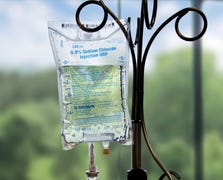Pressure Mounts to Rid IV Products of PVC, DEHP
February 22, 2012

Last month, West Coast managed healthcare provider Kaiser Permanente announced that it would no longer purchase IV bags or tubing that contain PVC or the plasticizer DEHP. Although the move away from PVC- and DEHP-containing IV products has been picking up momentum in recent years, Kaiser's proclamation is another sign of the definitive phasing out of the materials. To gain some insight, MPMN spoke with Kathy Kovalic, director of marketing, drug delivery & fluid therapy, at B. Braun Medical Inc. about what this firm stance means for the medical device industry.
MPMN: What are some of the safety issues associated with PVC and DEHP?
Kovalic: The issues are out there for both our patients and the environment. PVC and DEHP are both commonly used in IV bags, IV tubing, and product packaging. DEHP is added to make the plastic more flexible; however, it does not adhere to the plastic, but "floats" within the vinyl structure. During certain therapies, DEHP can leach from the structure and be infused along with the IV fluid, medication, or blood transfusion, thus entering the patient's bloodstream. Blood products and several drugs, such as Paclitaxel, enhance leaching of DEHP from PVC containers. IV containers that do not contain DEHP eliminate the risk of toxicity, however. DEHP has been scientifically documented as a reproductive toxicant.
These PVC-containing products also pose an environmental hazard when incinerated as waste material. When incinerated, PVC causes emissions of dioxin, a known human carcinogen that also causes reproductive and developmental disorders. Additionally, if products containing DEHP are disposed of in a landfill, the DEHP plasticizer can leach into the soil and ground water.
MPMN: What does Kaiser's transition away from DEHP and PVC IV products mean for medical device manufacturers?
 Kovalic: As a manufacturer, this new model of "green purchasing" in the healthcare sector will have to be taken into consideration. Product evaluation, now more than ever, includes the environmental and health impacts of each medical item. What this does is encourages suppliers across the industry to provide greener products, benefiting patients, staff, and the environment.
Kovalic: As a manufacturer, this new model of "green purchasing" in the healthcare sector will have to be taken into consideration. Product evaluation, now more than ever, includes the environmental and health impacts of each medical item. What this does is encourages suppliers across the industry to provide greener products, benefiting patients, staff, and the environment.
The focus on products is just one aspect of these green initiatives, however. Healthcare providers are looking to suppliers that share the same environmental commitment by requesting this type of information-a company's environmental commitment, use of potentially harmful chemicals in products, and information about product and packaging recycling.
MPMN: Roughly how many companies currently offer phthalate-free IV products?
Kovalic: There are some out there. B. Braun, though, was the first, and currently offers the industry's largest line of green products, including a broad portfolio of products that are not manufactured with DEHP, PVC, or latex. We have been supplying providers with these environmentally responsible products for more than 30 years. As the demand for these types of products continues to increase, B. Braun is proud to already be a market leader in this area.
MPMN: Do you think other healthcare providers will soon follow Kaiser's lead? Why or why not?
Kovalic: Yes, if they have not already. It's important to understand the impact on the environment a product has from the manufacturing process to disposal. It is also important to understand even the slightest impact on patients clinically. Certain plastics have been identified not only in healthcare, but in general consumer use, as potentially harmful. This is an adoption of green practices that enhances patient safety and, at the same time, demonstrates corporate and environmental responsibility.
There is a waste story here, too. Using these types of products can reduce the amount of landfill waste generated and lower disposable costs. Empty, non-PVC containers weigh less than comparable PVC containers, and disposable costs can be as much as 30% less annually.
You May Also Like

.png?width=300&auto=webp&quality=80&disable=upscale)
